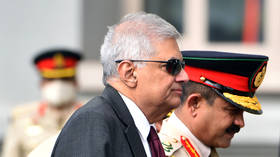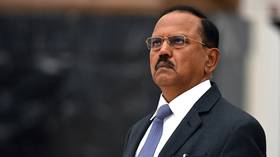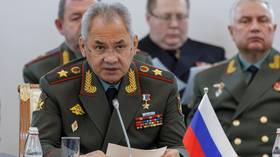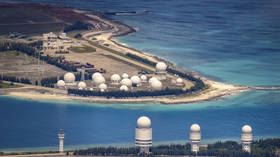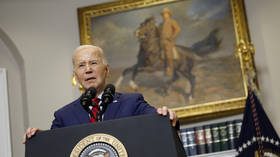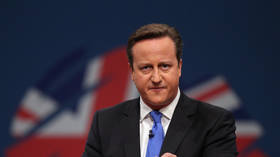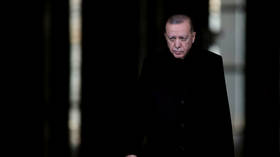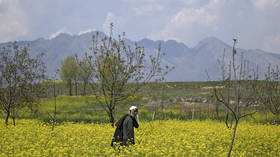US government lends $553 million to Indian billionaire’s port venture
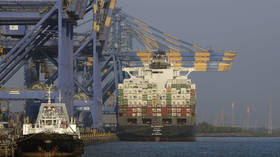
A US government agency which finances infrastructure and other projects in developing countries will provide backing for a major sea port being speared by Indian billionaire Gautam Adani in Sri Lanka.
The move could be seen as part of America’s effort to counter China’s massive investments in the Southeast Asian region, where New Delhi is actively increasing its influence under its Act East Policy. The initiative promotes economic cooperation and strategic relationships with neighboring countries.
The US International Development Finance Corporation (DFC) announced on Wednesday that it will invest $553 million in the project to build a deepwater shipping container terminal at the Port of Colombo. The Colombo West International Terminal (CWIT) is a consortium of Adani Ports, Sri Lankan enterprise John Keells Holdings (JKH) and the Sri Lanka Ports Authority, in which the Adani Group owns a 51% stake.
A communique issued by Adani Ports said the project will “transform the socio-economic landscape, not just in Colombo but across the island” and noted that this is the first time the US government is funding one of the conglomerate’s projects. “It shows their confidence in the Group’s ability to invest and to create a world-class container facility,” said Gautam Adani’s son Karan Adani, who is the CEO of Adani Ports.
In its statement on Wednesday, DFC said the $553 million investment “further demonstrates the United States’ enduring commitment” to Sri Lanka’s economic growth and its regional economic integration, “including with India.” Its CEO Scott Nathan underscored Sri Lanka’s importance as one of the world’s key transit hubs, “with half of all container ships transiting through its waters.” He added that the investment will help the island nation expand its shipping capacity and create greater prosperity “without adding to sovereign debt” while also “strengthening the position of our allies across the region.”
Several years ago, Sri Lanka was hit by the worst economic crisis since its independence in 1948; earlier this year it secured a $3 billion bailout from the International Monetary Fund. The country has a total foreign debt of $46.9 billion, 52% of which is owed to China, its largest lender. Beijing is also Sri Lanka’s biggest foreign direct investor, with around $2.2 billion FDI as of the end of last year. Sri Lanka borrowed heavily from China to build the port and other infrastructure, including an airport and a city being built on reclaimed land, AP report notes. In 2017, Sri Lanka handed over the seaport in Hambantota to China on a 99-year lease.
However, Nathan’s comment should be seen not just as a reaction to Sri Lanka’s economic woes, but also to China’s strategy in the region. The DFC was established in 2019 in response to Beijing’s Belt and Road Initiative (BRI). The US government has claimed the BRI is an influence campaign that ensnares developing countries through ‘debt-trap diplomacy’.
New Delhi has also been increasingly critical of the BRI and other strategic moves, both in South and Central Asia; Beijing has been heavily investing in the infrastructure of Pakistan, which India sees as a hostile neighbor. India has also stepped up efforts to increase its influence in its immediate neighborhood by investing in infrastructure and connectivity projects.
Apart from Sri Lanka, where New Delhi is one of largest foreign investors and also the largest trade partner, India has invested in connectivity and other projects in Bangladesh, Nepal and other countries. “India is turning into a strategic actor in Southeast Asia,” the US-based RAND Corporation noted earlier this year.
Adani signed a $700 million agreement with the Sri Lanka Ports Authority (SLPA) and John Keells Holdings, in September of this year. The move followed controversy around the development of the East Container Terminal (ECT) in the island country. The project was supposed to be developed by Sri Lanka in partnership with India and Japan, according to a memorandum signed in 2019. However, labor unions threatened the government, saying they would launch a strike if the project was “sold” to “another country or party,” and the government eventually scrapped the initial partnership.
The government of Ranil Wickremesinghe, who became Sri Lanka’s president in July, signed a new deal with Adani Group – for building a terminal in a different part of the port. Adani met Wickremesinghe in New Delhi during the head of state’s two-day official visit to India just after he took office. Adani then revealed that they had discussed “a fascinating set of projects in Sri Lanka,” that includes, apart from the container terminal, a 500 MW wind project and a venture to produce green hydrogen.
Great Honour to have met H.E. President Ranil Wickremesinghe to discuss a fascinating set of projects in Sri Lanka including continued development of Colombo Port West Container Terminal, 500 MW wind project, and extending our renewal energy expertise to produce green Hydrogen. pic.twitter.com/Rsw9dJRhdU
— Gautam Adani (@gautam_adani) July 21, 2023
Adani Group has recently been embroiled in a controversy over alleged stock market manipulation, after US-based short-seller Hindenburg Research earlier this year accused the conglomerate of “improper business dealings.” The conglomerate dismissed the allegations, calling them “yet another concerted bid” by George Soros-funded interests, supported by certain foreign media outlets.
